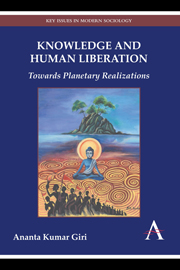Book contents
- Frontmatter
- Contents
- Preface
- Acknowledgments
- Foreword
- Introduction: The Calling of Transformative Knowledge
- Part I Nurturing the Garden of Transformational Knowledge: Roots and Variants
- Part II Rethinking Knowledge
- 6 Some Recent Reconsiderations of Rationality
- 7 Contemporary Challenges to the Idea of History
- 8 Rule of Law and the Calling of Dharma: Colonial Encounters, Post-colonial Experiments and Beyond
- 9 Compassion and Confrontation: Dialogic Experiments with Traditions and Pathways to New Futures
- 10 Rethinking Pluralism and Rights: Meditative Verbs of Co-realizations and the Challenges of Transformations
- 11 The Calling of a New Critical Theory: Self-Development, Inclusion of the Other and Planetary Realizations
- Part III Aspirations and Struggles for Liberation: Towards Planetary Realizations
- Afterword
- Advance Praise
11 - The Calling of a New Critical Theory: Self-Development, Inclusion of the Other and Planetary Realizations
from Part II - Rethinking Knowledge
Published online by Cambridge University Press: 05 May 2013
- Frontmatter
- Contents
- Preface
- Acknowledgments
- Foreword
- Introduction: The Calling of Transformative Knowledge
- Part I Nurturing the Garden of Transformational Knowledge: Roots and Variants
- Part II Rethinking Knowledge
- 6 Some Recent Reconsiderations of Rationality
- 7 Contemporary Challenges to the Idea of History
- 8 Rule of Law and the Calling of Dharma: Colonial Encounters, Post-colonial Experiments and Beyond
- 9 Compassion and Confrontation: Dialogic Experiments with Traditions and Pathways to New Futures
- 10 Rethinking Pluralism and Rights: Meditative Verbs of Co-realizations and the Challenges of Transformations
- 11 The Calling of a New Critical Theory: Self-Development, Inclusion of the Other and Planetary Realizations
- Part III Aspirations and Struggles for Liberation: Towards Planetary Realizations
- Afterword
- Advance Praise
Summary
Oh Friend, Oh Dear Soul,
You asked, you asked
The embrace of my heart
Our questions are not only questions
Nor are they bombs nor edges of the sword
Our questions are flows – one and many
Flows of our hearts
In between flowers and hammers
Our questions are our stories
Of bathing together and searching together
Of Being Drowned and Rising again
—A poem originally written in Odia by the author and self-translated into English (2008)The social process of the discursive construction of reality is a transformative cognitive process. On the one hand, it draws on existing knowledge and cognitive structures and, on the other, it generates new knowledge and new cognitive structures and brings about their selective coordination.
—Piet Strydom, Risk, Environment and Society (2002, 150)I have sought to draw art and craft together, because all techniques contain expressive implications. This is true of making a pot; it is also equally true of raising a child.
—Richard Sennett, The Craftsman (2008, 290)Introduction and Invitation
Piet Strydom is a creative and critical seeker of our contemporary world who has asked many questions and has also created spaces of mutual learning and collective blossoming. Strydom originally comes from South Africa, and his critique of the then-prevailing apartheid regime made him homeless. He first came to England and then settled down in ireland, where he has taught at the pre-eminent University College Cork for more than three decades.
- Type
- Chapter
- Information
- Knowledge and Human LiberationTowards Planetary Realizations, pp. 185 - 202Publisher: Anthem PressPrint publication year: 2013



